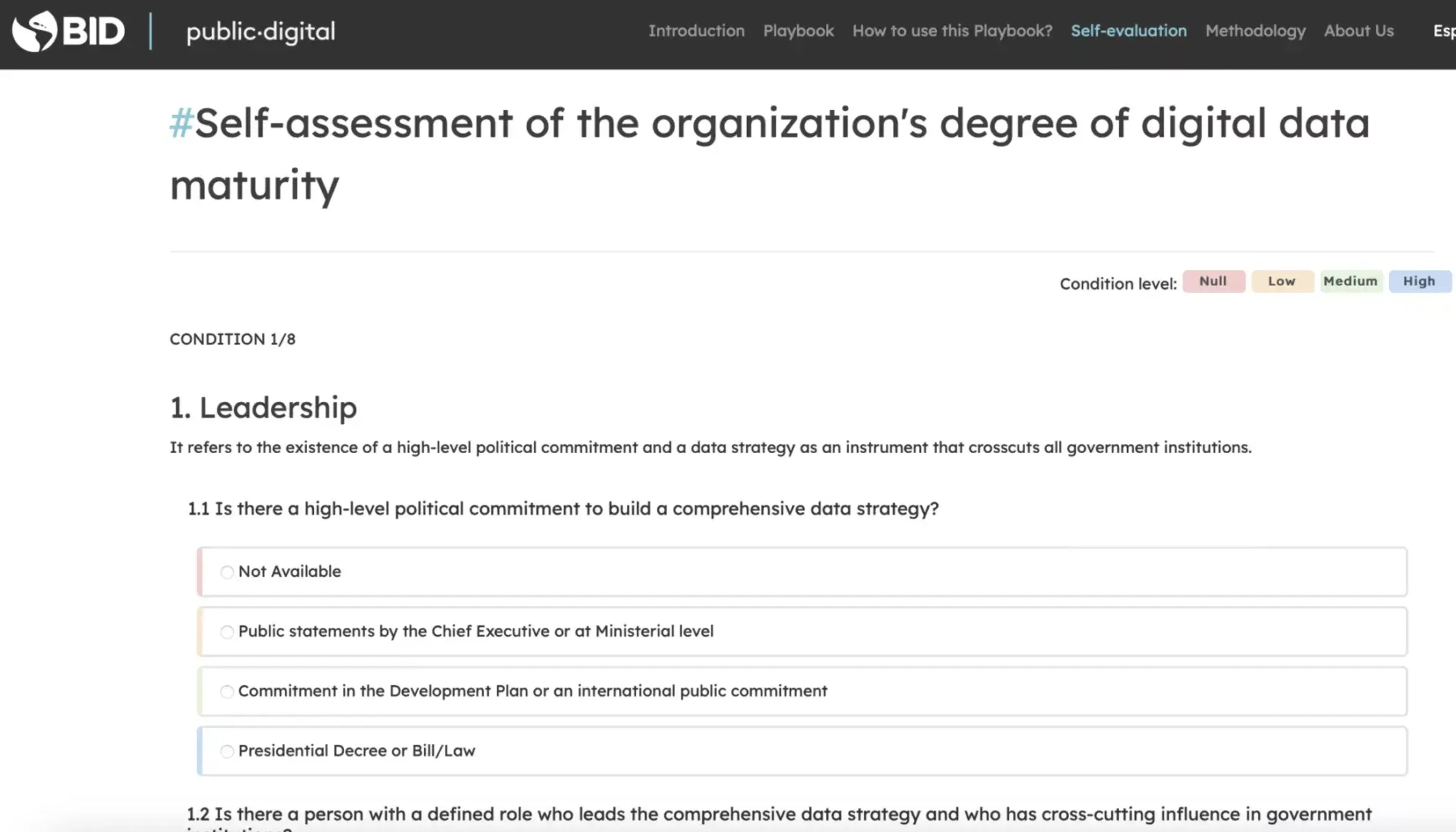Our guide for self-assessing data maturity levels
By Andrea Barenque, Data Intelligence Consultant and Public Digital Network member.
Since 2022, Public Digital has been working in Latin America and the Caribbean to develop a self assessment guide, or playbook, designed to help governments in the region self-assess and prepare data strategies in the public sector.
Designed in collaboration with the Inter American Development Bank (IDB), the playbook, available in github, is intended to be used and reused by governments, and has been developed with an awareness of the diversity of contexts governments operate within.
It provides a guide through which governments can examine their data maturity status through conditions like leadership, financing, regulatory framework, organisational structure, and data management.
Using the results of the self-assessment and the actionable recommendations provided, governments are able to prioritise those conditions that require greater attention, and determine actions in the short, medium and long term. With this roadmap, they will be equipped to develop a comprehensive, human-centred data strategy.
The playbook is designed as a tool for data teams: There is no ranking or index where teams compete to be in the top charts. As such, they are able to be honest and vulnerable during the evaluation in a way that will maximise the benefits of the assessment.

Self-assessing data maturity: Eight conditions
As illustrated in the playbook, the following eight conditions are the building blocks needed to create a successful data strategy:
1. Leadership: A high-level political commitment and a data strategy as an instrument that crosscuts all government institutions
2. Funding: A financial sustainability strategy that includes a budget specifically assigned to the management and promotion of data use cases, as well as the hiring of profiles necessary for the implementation of the policies.
3. Legislative and regulatory framework: A minimum layer of rules, laws, and/or regulations that concern data life cycle and the concepts which enable and control its use.
4. Organisational structure and institutional responsibilities: An office or team with attributions and experience to design and implement data policies in coordination with other government areas.
5. Data Collection, Use, Storage and Distribution: A general data catalogue/inventory, and official classification of data in the country or repository with data already available for use and reuse.
6. Capacity building: Training programs for public servants related to the data life cycle, types of data, standards, and data analysis, as well as links with organisations to provide these services inside and outside government.
7. User demand and community of practice: A mapping of active users and data needs outside the government; institutionalised mechanisms for permanent dialogue with actors from civil society and industry; technical capabilities of users and digital interaction between citizens and government.
8. Technology and data exchange mechanisms: National ICT policies or strategies that contain the minimum conditions for the storage, security transformation and transfer of data between actors from different sectors.
Implementing the Playbook: the Government of Belize
To test the accuracy of the tool, we initiated a pilot project with the government of Belize, led by the E-Governance and Digitization Unit, over a four-month period.
This pilot included desk research, interviews with authorities, and a workshop to share the main results.
This work allowed Belize to create a roadmap to develop their first data strategy, building an accurate picture of the current maturity level of the organisation and establishing the actions and initiatives to move forward.
What's next
At present, there is an imperative - and an opportunity - to develop how we measure impact and calculate the economic value of data.
Earlier this month, Public Digital and IDB were in Uruguay presenting the playbook at ConDatos, the largest data event in the region. We were grateful for the opportunity to share our work and receive feedback from the community as part of evolving this always-in-beta document.
We aim to continue to evolve this playbook and methodology while we work with data organisations globally, and are eager to see where this project will take us as a community.